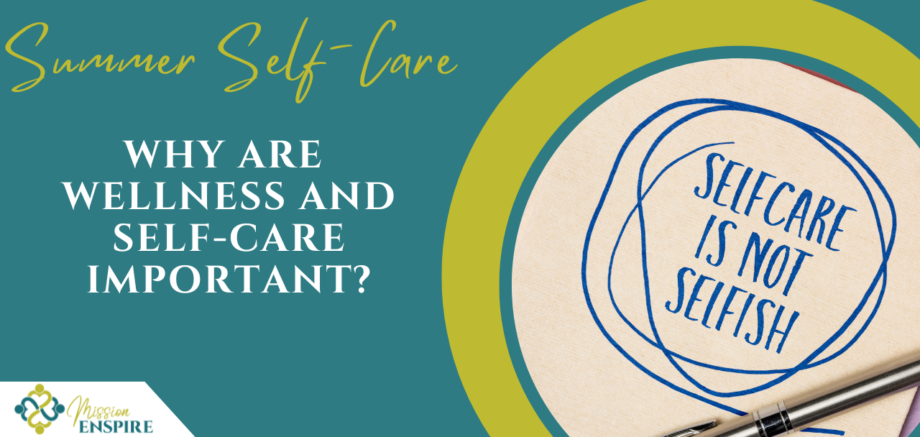Welcome to August and welcome back to the Flourishing Fiercely blog! With hotter weather in full swing (for most of us) and talk of back-to-school season, we’re reminded that summer is in its final stretch–but there’s still plenty of time left to enjoy it! Did you know that August is National Wellness Month? I’ve written frequently over the past months about how often health and wellness comes up as a topic in goal-setting, coaching, and making fresh starts in our lives–so I wanted to dig into the topic of wellness a bit more this month by focusing on self-care.
What is Self-Care, Anyway?
You’ve probably noticed that the concept of “self-care” has exploded in popularity and visibility in recent years, whether among your friends and family, in magazines or television shows, or all over social media. It’s a buzzword for sure–but what exactly is self-care, at its core? Self-care is the act of taking care of yourself. It is doing exactly what you need to do to feel your best all around. This includes mentally, physically, and emotionally. Each person has their own way to give themselves self-care. This can be anything from quitting your exhausting job, to getting your hair done, or ensuring you have time to read each evening before bed.
Taking care of yourself should not be overlooked. There are many benefits that result from a self-care routine. If you are not taking care of yourself eventually it can lead to overwhelming stress, lack of confidence, less productivity at work and even cause deteriorating relationships with family and friends. To really understand self-care, you need to understand yourself first. Ask yourself these questions to gain some clarity:
- What are the things I need to do to feel complete?
- What are things I need to do to feel in tune with myself emotionally or spiritually? (For example, I find the ocean relaxing and restoring. I don’t get a chance to spend much time there since I live in the Midwest, but when I was at a conference in Florida earlier this year, I took advantage of the opportunity to relax on the beach one evening, listening to praise and worship music and the sound of the waves.)
- What activities help me relieve stress?
- Is there anything I can eliminate from my daily schedule that is preventing me from taking care of myself?
The way you answer these questions determines your self-care needs. Once you have defined your needs your next step is to add it to your schedule and do them to reap the benefits. Self-care is extremely beneficial for optimal health, productivity, and your relationships.
Self-care is simply doing the things you like to do that helps you feel happy and healthy. There really is no limit to what self-care is because it’s all about what you like doing for yourself and your personality that makes you a better person, parent, spouse, sibling, and friend. Don’t do things you think you need to do or what others say you need to do. Do what you know you love and want. It doesn’t have to require money or be anything extravagant. Meditating, getting up early for some quiet alone time, praying, reading a book, or going for a walk or jog are some simple ideas.
The Benefits of Self-Care
Neglecting yourself and putting your needs on the back burner can lead to an unhealthy life. Self-care should be a part of everyone’s personal schedule and shouldn’t be overlooked due to time or because someone believes it is selfish. Self-care is essential to having a healthy, productive, and happy life.
Self-care is imperative because it prevents:
- Stress. Most everyone lives with stress in their daily lives but it’s important to try to manage stress as much as possible. Plenty of medical research shows that stress can cause many negative side effects. This includes headaches, low energy, aches and pain and even insomnia.
- Burnout. Burnout is another form of extreme stress that results in physical and emotional exhaustion, negativity, lack of enjoyment and the feeling of hopelessness. Burnout typically happens when people are overworked or during events that you feel you can’t control. Self-care allows you to take a break from these activities that can result in burnout. Even if it’s a simple one-minute break where you just close your eyes and breathe, it will help reduce this type of stress.
- Negativity. Putting everyone else’s needs over your own will turn just about anyone negative. The feeling of not being important and that their needs overpower yours is a horrible feeling. The fact is, the more your needs are met the more others’ needs will be met too. You will experience less bitterness and resentment towards others if you take care of yourself.
Self-care is a very broad term and can honestly mean anything. Self-care can be described by each person differently. To one person it can be about doing anything that is fun and exciting but to the next person it is about being quiet and fully relaxed in the moment and even then, someone else might think it’s a combination of both. Self-care is an individualized plan of activities that will allow you to be mentally, physically and emotionally healthy.
If you haven’t been practicing self-care for a while or at all, it can be overwhelming at first to break it down and know where to start.
- Self-Care First. Just like health studies have shown exercising first thing in the morning gives the best results the same goes for self-care. Take care of yourself first to start your day off positively. When you get things out of the way you’ll feel accomplished and awesome.
- Schedule Self-Care. Today people are more productive than ever. But they are also distracted. The best course of action is to schedule the things you want to do for self-care. Schedule that haircut or massage. Schedule a short phone call with friends or family during your break at work. Schedule lunch with friends. If you write it down, you’re more likely to do it.
- Be Attentive. Be aware of your surroundings as well as yourself. Your environment and knowing what you like and dislike plays a major part in self-care. If you are adding things to your routine that you don’t like and don’t make you happy, look for a way to remove it or make it better.
- Reward Yourself. Self-care shouldn’t only be about rewarding yourself, but it is a great way to get started. It could help you to get some much-needed work done and help you get the care you need. Maybe you know you need to exercise but it’s not something that you really enjoy doing. Start rewarding yourself for doing it so that you get an immediate benefit for something that will only provide long-term results. For example, did you do your exercise every day for a month? Schedule a facial or massage to reward yourself.
- Try Meditation. Meditation is a great way to clear your mind and help you relax. The goal is to focus on breathing and nothing else. Studies show that meditation and prayer help cut down on stress and improve memory.
- Take Alone Time. Self-care doesn’t have to be about going and spending a bunch of money or doing exciting activities. Sometimes people just need alone time. Take time away from children and coworkers so that you can rejuvenate and focus on your own thoughts.
- Spend Time with Friends and Family. Schedule some time with friends and family. Go out to dinner or play board games at their house. Do something different than you usually would do with them also. Make it a date so you have something to look forward to.
- Buy Something. Go buy a new outfit, a pair of hiking boots or a coffee at Starbucks. (Caveat: this is a prime example of how varied and individualized self-care can be. Some of us get a mental mini-boost from buying ourselves a treat; others find shopping to be an exhausting chore or get stressed out by the idea of spending extra money.) If you do enjoy buying the occasional treat as a form of self-care, add it to your budget so you don’t go overboard. It’s okay to splurge every now and then if it makes you feel good and isn’t derailing your financial stability or longer-term financial goals.
Self-care can be simple. All you need to do is figure out what is best for you and do it. One thing that might help you decide what to do is to write down the goals that you have for yourself so that you can ensure that the things you do lead you towards meeting those goals. (If you need a refresher on goal-setting, I wrote about how to get started setting, refining, and sticking to your goals in my April blog series.) Having shared all of the above–don’t get me wrong, it isn’t always easy or smooth to carve out time, money, or energy to focus on our self-care! Next week, I’ll share some common obstacles to self-care and tips for overcoming them. Until then, I hope you can find some time in your week for a little self-care for yourself (and I’ll commit to do the same)!


Thank you! What a good reminder and I love the phrase “self-care is not selfish.”
You are very welcome Laura. And yes I have to constantly remind myself that self-care is definitely not selfish 🙂